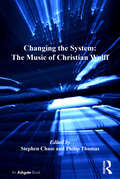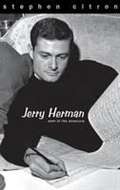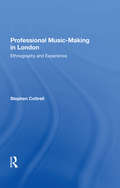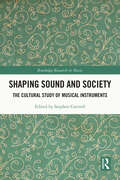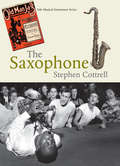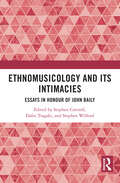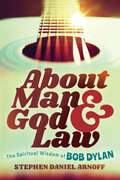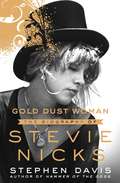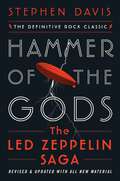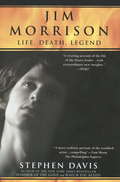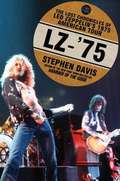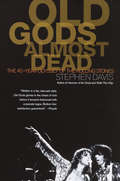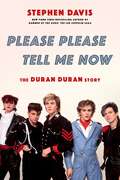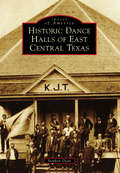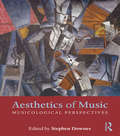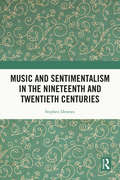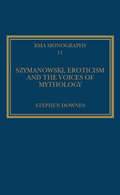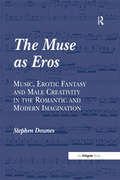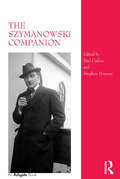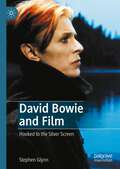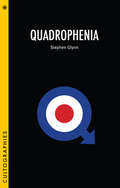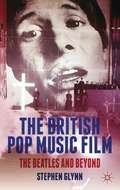- Table View
- List View
Changing the System: The Music Of Christian Wolff
by Stephen ChaseChristian Wolff is a composer who has followed a distinctive path often at the centre of avant-garde activity working alongside figures such as John Cage, Merce Cunningham, and Cornelius Cardew. In a career spanning sixty years, he has produced a significant and influential body of work that has aimed to address, in a searching and provocative manner, what it means to be an experimental and socially aware artist. This book provides a wide-ranging introduction to a composer often overlooked despite his influence upon many of the major figures in new music since the 1950s from Cage to John Zorn to the new wave of experimentalists across the globe. As the first detailed analysis of the music of this prolific and highly individual composer, Changing the System: The Music of Christian Wolff contains contributions from leading experts in the field of new and experimental music, as well as from performers and composers who have worked with Wolff. The reception of Wolff's music is discussed in relation to the European avant-garde and also within the context of Wolff's association with Cage and Feldman. Music from his earliest compositions of the 1950s, the highly indeterminate scores, the politically-inspired pieces up to the most recent works are discussed in detail, both in relation to their compositional techniques, general aesthetic development, and matters of performance. The particular challenges and aesthetic issues arising from Wolff's idiosyncratic notations and the implications for performers are a central theme. Likewise, the ways in which Wolff's political persuasions - which arguably account for some of the notational methods he chooses - have been worked out through his music, are examined. With a foreword by his close associate Michael Parsons, this is a valuable addition to experimental music literature.
Jerry Herman: Poet of the Showtune
by Stephen CitronThis revealing and comprehensive book tells the full story of Jerry Herman's life and career, from his early work in cabaret to his recent compositions for stage, screen, and television. Stephen Citron draws on extensive open-ended interviews with Jerry Herman as well as with scores of his theatrical colleagues, collaborators, and close friends. The resulting book--which sheds new light on each of Herman's musicals and their scores--abounds in fascinating anecdotes and behind-the-scenes details about the world of musical theater. Readers will find a sharply drawn portrait of Herman's private life and his creative talents. Citron's insights into Herman's music and lyrics, including voluminous examples from each of his musicals, are as instructive as they are edifying and entertaining.
Professional Music-making in London: Ethnography and Experience (Soas Musicology Ser.)
by Stephen CottrellProfessional Music-Making in London is an engaging yet innovative study which examines the lives and work of Western art musicians from an ethnographic perspective. Drawing in part on his own professional experience, Stephen Cottrell considers to what extent musicians in Western society conform to Alan Merriam's paradigmatic assessment of them as having low status yet high respect, as well as being given an unusual degree of licence to deviate from convention. The book draws on a wide variety of approaches from scholars elsewhere: from ethnomusicologists such as Bruno Nettl and Henry Kingsbury, performance theorists such as Richard Schechner and Victor Turner, as well as psychologists such as Sigmund Freud and Melanie Klein. This rich intellectual heritage provides the framework for discussion of a variety of themes, including how musicians conceive their self identity and how this is negotiated in the professional musical world; how the deputy system facilitates musical exchange and engenders gift relationships; how humour lubricates social and musical relationships and mitigates the stresses of musicians' lives; and how the events in which musicians participate can be viewed as quasi-rituals, and thus related to analogous events in non-Western cultures. The focus of this study is on professional music-making in London, one of the world's busiest centres of musical performance - yet the issues raised and explored are deeply relevant to other major centres of Western art music, such as New York, Berlin or Sydney. Ethnomusicologists, anthropologists, musicologists, performers, teachers and concert-goers will find this book a stimulating insight into, and investigation of, Western art musicians and their place in today's world.
Shaping Sound and Society: The Cultural Study of Musical Instruments (Routledge Research in Music)
by Stephen CottrellThis volume brings together leading voices from the new wave of research on musical instruments to consider how we can connect the material aspects of instruments with their social function, approaches that have been otherwise too frequently separated in musical scholarship. Shaping Sound and Society: The Cultural Study of Musical Instruments locates the instruments at the centre of cultural interactions. With contributions from ten scholars spanning a variety of methodologies and a wide range of both contemporary and historic music cultures, the volume is divided into three sections. Contributors discuss the relationships between makers, performers, and their local communities; the different meanings that instruments accrue as they travel over time and place; and the manner in which instruments throw new light on historic music cultures. Alongside the scholarly chapters, the volume also includes a selection of shorter interludes based on interviews with makers of comparatively new instruments, offering further insights into the process of musical instrument innovation. An essential read for students and academics in the fields of music and ethnomusicology, this volume will also interest anyone looking to understand how the cultural interaction of musical instruments is deeply informed and influenced by social, technological, and cultural change.
The Saxophone
by Stephen CottrellIn the first fully comprehensive study of one of the world’s most iconic musical instruments, Stephen Cottrell examines the saxophone’s various social, historical, and cultural trajectories, and illustrates how and why this instrument, with its idiosyncratic shape and sound, became important for so many different music-makers around the world. After considering what led inventor Adolphe Sax to develop this new musical wind instrument, Cottrell explores changes in saxophone design since the 1840s, before examining the instrument's role in a variety of contexts: in the military bands that contributed so much to the saxophone's global dissemination during the nineteenth century; as part of the rapid expansion of American popular music around the turn of the twentieth century; in classical and contemporary art music; in world and popular music; and, of course, in jazz, a musical style with which the saxophone has become closely identified.
Ethnomusicology and its Intimacies: Essays in Honour of John Baily
by Stephen Cottrell, Dafni Tragaki, and Stephen WilfordEthnomusicology and its Intimacies situates intimacy, a concept that encompasses a wide range of often informal social practices and processes for building closeness and relationality, within the ethnomusicological study of music and sound. These scholarly essays reflect on a range of interactions between individuals and communities that deepen connections and associations, and which may be played out relatively briefly or nurtured over time. Three major sections on Performance, Auto/biographical Strategies, and Film are each prefaced by an interview with a scholar or practitioner with close knowledge of the subject that links the chapters in that section. Often drawing directly on fieldwork experience in a variety of contexts, authors consider how concepts of intimacy can illuminate the ethnographic study of music, addressing questions such as: how can we understand ethnomusicological and ethnographic research and performance as processes of musically mediated intimacy? How are the longstanding relationships we develop with others particularly intimated by and through musicking? How do we understand the musically intimate relationships of others and how do these inflect our own musical intimacies? How does music represent, inscribe, constrain, or provoke social or personal intimacies in particular contexts? The volume will appeal to all scholars with interests in music and how it is used to construct relationships in different contexts around the world.
About Man and God and Law: The Spiritual Wisdom of Bob Dylan
by Stephen Daniel ArnoffAbout Man and God and Law is the story of how Bob Dylan sparked a revolution of the spirit and why it matters today.Many of our assumptions about empathy, sensual pleasure, and the essence of work, community, country, race, and the divine have germinated in Bob Dylan’s need to know what’s blowing in the wind and how it feels. Tracing his work and vision through themes that have shaped religious and cultural history for millennia, Stephen Daniel Arnoff uncovers how Bob Dylan has re-enchanted ancient questions of meaning and purpose throughout popular culture, inspiring a pantheon of prophetic musicians along the way. This field guide to Dylan's spiritual wisdom aims to make good on the promise that if we look closely enough at his body of work—precisely at a moment when the world we thought we knew seems like uncharted territory—we can open up our eyes to see not only where we really are, but where we need to go.
Gold Dust Woman: The Biography of Stevie Nicks
by Stephen Davis<p>Stevie Nicks is a legend of rock, but her energy and magnetism sparked new interest in this icon. At sixty-nine, she's one of the most glamorous creatures rock has known, and the rare woman who's a real rock ‘n' roller.</p> <p>Nicks' work and life are equally sexy and interesting, and Davis delves deeply into each, unearthing fresh details from new, intimate interviews and interpreting them to present a rich new portrait of the star. Just as Nicks (and Lindsey Buckingham) gave Fleetwood Mac the "shot of adrenaline" they needed to become real rock stars―according to Christine McVie―Gold Dust Woman is vibrant with stories and with a life lived large and hard.</p>
Hammer of the Gods: The Led Zeppelin Saga
by Stephen DavisThe gold-standard biography of the band Led Zeppelin—revised and updated with new material for fans of the band and this beloved rock classic.“One of the most notorious rock biographies ever written.” —Chicago Tribune The members of Led Zeppelin are major deities in the pantheon of rock gods. The first and heaviest of the heavy metal monsters, they violently shook the foundations of rock music and took no prisoners on the road. Their tours were legendary, their lives were exalted, and their music transcendent. No band ever flew as high as Led Zeppelin or suffered so disastrous a fall. And only some of them lived to tell the tale.Originally published in 1985, and last updated in 2008, Hammer of the Gods is considered the ultimate word on Led Zeppelin, and a definitive rock and roll classic that captures the first heavy metal monsters in all their excessive glory. With new material from bestselling biographer Stephen Davis this edition includes the story of their legendary one-night-only reunion in 2007 and the post-Zeppelin work of each member, especially Robert Plant’s Grammy-winning collaborations with Alison Krauss. An up-to-date discography brings this New York Times bestseller fully to the present, and will captivate a new generation of music fans, Zeppelin fans, and readers.
Jim Morrison: LIfe, Death, Legend
by Stephen DavisAs the lead singer of the Doors, Jim Morrison's searing poetic vision and voracious appetite for sexual, spiritual, and psychedelic experience inflamed the spirit and psyche of a generation. Since his mysterious death in 1971, millions more fans from a new generation have embraced his legacy, as layers of myth have gathered to enshroud the life, career, and true character of the man who was James Douglas Morrison.<P> In Jim Morrison, critically acclaimed journalist Stephen Davis, author of Hammer of the Gods, unmasks Morrison's constructed personas of the Lizard King and Mr. Mojo Risin' to reveal a man of fierce intelligence whose own destructive tendencies both fueled his creative ambitions and brought about his downfall. Gathered from dozens of original interviews and investigations of Morrison's personal journals, Davis has assembled a vivid portrait of a misunderstood genius, tracing the arc of Morrison's life from his troubled youth to his international stardom, when his drug and alcohol binges, tumultuous sexual affairs, and fractious personal relationships reached a frenzied peak. For the first time, Davis is able to reconstruct Morrison's last days in Paris to solve one of the greatest mysteries in music history in a shocking final chapter.<P> Compelling and harrowing, intimate and revelatory, Jim Morrison is the definitive biography of the rock idol in snakeskin and leather who defined the 1960s.
Lz-'75
by Stephen DavisStephen Davis's brilliantly-written personal account of criss-crossing America with Led Zeppelin on their 1975 tour. A warts-and-all snapshot of the world's biggest hard-rock band at their peak. As a young rock writer Stephen Davis landed the ultimate commission - touring America with Led Zeppelin. This is a personal account by Davis of his journey, which saw him crossing the country with the band on board the Starship, their famous Boeing passenger jet, complete with deep shag purple carpet, electric pianos, girlfriends and star-struck hangers-on. This is also the story of one of the hardest-living bands in the world at their peak. For Robert Plant, Jimmy Page, John Paul Jones and John Bonham, the most beautiful women in America tear their spangled jackets from them and riots start outside their gigs. LZ-75 captures a few perfect months in rock, when Led Zeppelin epitomised the free-living rock dream, but, like Icarus, their wings were already beginning to melt. It wouldn't be long before John Bonham died of a vodka overdose, and punk killed their brand of monumental rock. With it's up-close-and-personal accounts of band members, managers, groupies, fans and drug-dealers, there's a lot of Almost Famous about this book - Led Zep's 1975 tour is in fact the very one on which Cameron Crowe's film was based. Stephen Davis was barely twenty in 1975, but now he is recognised as one of the best rock writers in the world. He is the author of the mega-selling Hammer of the Gods - a biography of Led Zeppelin. He recently unearthed his notebooks of the 1975 tour - which he didn't use for Hammer of the Gods - to write LZ-75. LZ-75: ACROSS AMERICA WITH LED ZEPPELIN is a wonderful and unique thing - a beautifully succinct account of a single moment in rock, when no lyric was too far-fetched, no drink went undrunk and no expense was ever, ever spared. It's a moment that will never be repeated.
Old Gods Almost Dead: The 40-year Odyssey of the Rolling Stones
by Stephen DavisThe acclaimed, bestselling rock-and-roll biographer delivers the first complete, unexpurgated history of the world's greatest band. The saga of the Rolling Stones is the central epic in rock mythology. From their debut as the intermission band at London's Marquee Club in 1962 through their latest record-setting Bridges to Babylon world tour, the Rolling Stones have defined a musical genre and experienced godlike adulation, quarrels, addiction, legal traumas, and descents into madness and death_while steadfastly refusing to fade away. Now Stephen Davis, the New York Times bestselling author of Hammer of the Gods and Walk This Way, who has followed the Stones for three decades, presents their whole story, replete with vivid details of the Stones' musical successes and personal excesses. Born into the wartime England of air-raid sirens, bombing raids, and strict rationing, the Rolling Stones came of age in the 1950s, as American blues and pop arrived in Europe. Among London's most ardent blues fans in the early 1960s was a short blond teenage guitar player named Brian Jones, who hooked up with a lorry driver's only son, Charlie Watts, a jazz drummer. At the same time, popular and studious Michael Philip Jagger--who, as a boy, bawled out a phonetic version of "La Bamba" with an eye-popping intensity that scared his parents--began sharing blues records with a primary school classmate, Keith "Ricky" Richards, a shy underachiever, whose idol was Chuck Berry. In 1962 the four young men, joined by Bill Perks (later Wyman) on bass, formed a band rhythm and blues band, which Brian Jones named the "the Rollin' Stones" in honor of the Muddy Waters blues classic. Using the biography of the Rolling Stones as a narrative spine, Old God Almost Dead builds a new, multi-layered version of the Stones' story, locating the band beyond the musical world they dominated and showing how they influenced, and were influenced by, the other artistic movements of their era: the blues revival, Swinging London, the Beats, Bob Dylan's Stones-inspired shift from protest to pop, Pop Art and Andy Warhol's New York, the "Underground" politics of the 1960s, Moroccan energy and European orientalism, Jamaican reggae, the Glam and Punk subcultures, and the technologic advances of the video and digital revolution. At the same time, Old Gods Almost Dead documents the intense backstage lives of the Stones: the feuds, the drugs, the marriages, and the affairs that inspired and informed their songs; and the business of making records and putting on shows. The first new biography of the Rolling Stones since the early 1980s, Old Gods Almost Dead is the most comprehensive book to date, and one of the few to cover all the band's members. It is a celebration of the Rolling Stones as an often courageous, often foolish gang of artists who not only showed us new worlds, but new ways of living in them. It is a saga as raunchily, vibrantly entertaining as the Stones themselves.
Please Please Tell Me Now: The Duran Duran Story
by Stephen DavisLifelong fans and interested newcomers will love this stunning biography of Duran Duran by the bestselling author of Gold Dust Woman and Hammer of the Gods.In Please Please Tell Me Now, bestselling rock biographer Stephen Davis tells the story of Duran Duran, the quintessential band of the 1980s. Their pretty boy looks made them the stars of fledgling MTV, but it was their brilliant musicianship that led to a string of number one hits. By the end of the decade, they had sold 60 million albums; today, they've sold over 100 million albums—and counting.Davis traces their roots to the austere 1970s British malaise that spawned both the Sex Pistols and Duran Duran—two seemingly opposite music extremes. Handsome, British, and young, it was Duran Duran that headlined Live Aid, not Bob Dylan or Led Zeppelin. The band moved in the most glamorous circles: Nick Rhodes became close with Andy Warhol, Simon LeBon with Princess Diana, and John Taylor dated quintessential British bad girl Amanda De Cadanet. With timeless hits like "Hungry Like the Wolf," "Girls on Film," "Rio," "Save a Prayer," and the bestselling James Bond theme in the series' history, "A View to Kill," Duran Duran has cemented its legacy in the pop pantheon—and with a new album and a worldwide tour on the way, they show no signs of slowing down anytime soon. Featuring exclusive interviews with the band and never-before-published photos from personal archives, Please Please Tell Me Now offers a definitive account of one of the last untold sagas in rock and roll history—a treat for diehard fans, new admirers, and music lovers of any age.
Watch You Bleed
by Stephen DavisWith 90 million of the band's records sold worldwide since 1987, Guns N' Roses prolonged rock music past its sell by date with controversial albums and immense, often riotous world tours. But the band's complete story has never been fully told - until now. In his sixth major rock biography, Stephen Davis - author of the legendary Hammer of the Gods - details the riveting story of a band that originated in the gutters of Sunset Strip and went on to become the biggest, baddest band on the planet. Davis brilliantly captures the birth of Guns' raw power, which - despite rape charges, drug-induced rampages, and a general appetite for destruction - launched the band into the pantheon of rock gods such as Led Zeppelin and the Rolling Stones. With a wealth of detail, Davis looks at Axl's unrelenting quest to release the long-awaited, mystery shrouded Chinese Democracy album, as well as the further adventures of some of the Gunners under the banner of the hard-rocking band Velvet Revolver. In Watch You Bleed, for the first time, millions of Guns N' Roses fans will learn the whole truth - sometime funny, sometimes tragic - about the last of the great rock bands.
Watch You Bleed: The Saga of Guns N' Roses
by Stephen DavisThe New York Times bestselling epic tale of the last great rock band From the bestselling author of Hammer of the Gods comes the complete story of Guns N? Roses ? from their drug-fueled blastoff in the 80s to the turbulent life of legendary singer Axl Rose, and his fifteen-year, multimillion dollar quest to make the perfect hard rock album. Riotous world tours. Drug-induced rampages. One hundred millions albums sold. In his sixth major rock biography, Stephen Davis details the riveting story of the last great rock band. Watch You Bleed documents the life of every band member, including the improbable story of W. Axl Rose. Davis brilliantly captures the Guns? raw power ? from the gutters of Sunset Strip to the biggest stadiums on the planet. Based on exclusive interviews, private archives, and packed with stunning revelations, Watch You Bleed is the savage, definitive, and highly unauthorized story of Guns N? Roses. For the first time, millions of fans will learn the whole truth about this legendary band.
Historic Dance Halls of East Central Texas
by Stephen DeanTexas dance halls are iconic structures that have played a prominent role in the state's culture from its earliest stages. They became central institutions in the earliest European settlements and provided these immigrant communities with a common, central space in which to build new ways of life in a new land. The settlement patterns of the mostly German, Czech, Polish, and other central European migrants of this period gave East Central Texas the state's greatest concentration of dance halls. Thousands of these halls were built throughout the 19th and early 20th centuries, but at present, their numbers have dwindled considerably, and many are at risk.
Aesthetics of Music: Musicological Perspectives
by Stephen DownesAesthetics of Music: Musicological Approaches is an anthology of fourteen essays, each addressing a single key concept or pair of terms in the aesthetics of music, collectively serving as an authoritative work on musical aesthetics that remains as close to 'the music' as possible. Each essay includes musical examples from works in the 18th, 19th, and into the 20th century. Topics have been selected from amongst widely recognised central issues in musical aesthetics, as well as those that have been somewhat neglected, to create a collection that covers a distinctive range of ideas. All essays cover historical origins, sources, and developments of the chosen idea, survey important musicological approaches, and offer new critical angles or musical case studies in interpretation.
After Mahler
by Stephen DownesThe music of Gustav Mahler repeatedly engages with Romantic notions of redemption. This is expressed in a range of gestures and procedures, shifting between affirmative fulfilment and pessimistic negation. In this groundbreaking study, Stephen Downes explores the relationship of this aspect of Mahler's music to the output of Benjamin Britten, Kurt Weill and Hans Werner Henze. Their initial admiration was notably dissonant with the prevailing Zeitgeist – Britten in 1930s England, Weill in 1920s Germany and Henze in 1950s Germany and Italy. Downes argues that Mahler's music struck a profound chord with them because of the powerful manner in which it raises and intensifies dystopian and utopian complexes and probes the question of fulfilment or redemption, an ambition manifest in ambiguous tonal, temporal and formal processes. Comparisons of the ways in which this topic is evoked facilitate new interpretative insights into the music of these four major composers.
Music and Sentimentalism in the Nineteenth and Twentieth Centuries
by Stephen DownesIn a wide-ranging study of sentimentalism’s significance for styles, practices and meanings of music in the nineteenth and twentieth centuries, a series of interpretations scrutinizes musical expressions of sympathetic responses to suffering and the longing to belong. The book challenges hierarchies of artistic value and the associated denigration of sentimental feeling in gendered discourses. Fresh insights are thereby developed into sentimentalism’s place in musical constructions of emotion, taste, genre, gender, desire, and authenticity. The contexts encompass diverse musical communities, performing spaces, and listening practices, including the nineteenth-century salon and concert hall, the cinema, the intimate stage persona of the singer-songwriter, and the homely ambiguities of ‘easy’ listening. Interdisciplinary insights inform discussions of musical form, affect, appropriation, nationalisms, psychologies, eco-sentimentalism, humanitarianism, consumerism, and subject positions, with a particular emphasis on masculine sentimentalities. Music is drawn from violin repertory associated with Joseph Joachim, the piano music of Chopin, Schumann, and Liszt, sentimental waltzes from Schubert to Ravel, concert music by Bartók, Szymanowski and Górecki, the Merchant-Ivory adaptation of The Remains of the Day, Antônio Carlos Jobim’s bossa nova, and songs by Duke Ellington, Burt Bacharach, Carole King, Barry Manilow and Jimmy Webb. The book will attract readers interested in both the role of music in the history of emotion and the persistence and diversity of sentimental arts after their flowering in the eighteenth-century age of sensibility.
Szymanowski, Eroticism and the Voices of Mythology
by Stephen DownesThe desire to voice the artistic revelation of the truth of a precarious, multi-faceted, yet integrated self lies behind much of Szymanowski's work. This self is projected through the voices of deities who speak languages of love. The unifying figure is Eros, who may be embodied as Dionysus, Christ, Narcissus or Orpheus, and the gospel he proclaims tells of the resurrection and freedom of the desiring subject. This book examines Szymanowski's exploration of the relationship between the authorial voice, mythology and eroticism within the context of the crisis of the modern subject in Western culture. Stephen Downes analyses mythological and erotic aspects of selected songs from the composer's early career, moving to an interpretation of the voice of the homoerotic lover, embodied as a mad muezzin, in terms of heroic notions of Orphic elegy. Discussing the encounters of King Roger with the voices of Narcissus, the Siren and Dionysus, Downes shows how the composer uses the unifying Christ/Eros figure as a means of indicating that the King might be transformed from anguished despot to loving expressive subject. The book ends with an examination of Szymanowski's desire to fuse Slavonic and Middle-Eastern mythological inspirations in an attempt to fulfil a utopian vision of a pan-European culture bound together by the spirit of Eros.
The Muse as Eros: Music, Erotic Fantasy and Male Creativity in the Romantic and Modern Imagination
by Stephen DownesThe Muse has long been figured as a divine or erotically alluring consort to the virile male artist, who may inspire him or lead him to the edge of madness. This book explores the changing cultural expressions of the relationship between the male artist with a beloved, imagined or desired Muse, to offer new and penetrating perspectives on musical representations and transformations of creative masculine subjectivity, and important aspects of the shift from the styles and aesthetics of Romantic Idealism to Modernist Anxiety in music of the nineteenth and twentieth centuries. Each of the chapters begins with explorations into male artists' relationships with their Muse, and moves to analysis and interpretation which uncovers cultural constructions of masculine artistic inspiration and production, and their association with creatively inspiring and erotically charged relationships with a Muse. New insights are offered into the musical meaning and cultural significance of selected works by Rossini, Beethoven, Chopin, Liszt, Schumann, Wagner, Sibelius, Mahler, Bartók, Scriabin, Szymanowski, Debussy, Berg, Poulenc and Weill.
The Szymanowski Companion
by Stephen DownesThe Polish composer Karol Szymanowski is one of the most fascinating musical figures of the early twentieth century. His works included four symphonies, two violin concertos, the operas Hagith and King Roger, the ballet-pantomime Harnasie, the oratorio Stabat Mater, as well as numerous piano, violin, vocal and choral compositions. The profile and popularity of Szymanowski's music outside Poland has never been higher and continues to grow. The Szymanowski Companion constitutes the most significant and comprehensive reference source to the composer in English. Edited by two of the leading scholars in the field, Paul Cadrin and Stephen Downes, the collection consists of over 50 contributions from an international array of contributors, including recognized Polish experts. The Companion thus provides a systematic, authoritative and up-to-date compilation of information concerning the composer's life, thought and works.
David Bowie and Film: Hooked to the Silver Screen
by Stephen GlynnThis book constitutes the first monograph dedicated to an academic analysis of David Bowie’s appearances in film. Through close textual analysis together with production and reception histories, Bowie’s ‘silver screen’ career is explored in full. The book covers performance documentaries such as Ziggy Stardust and the Spiders from Mars, star vehicles ranging from the eulogised The Man Who Fell to Earth to the excoriated Just a Gigolo, plus roles from the horror chic of The Hunger and cult fantasy of Labyrinth to the valiant high-brow Baal and vainglorious high-budget Absolute Beginners, ending with Bowie as Bowie in Bandslam and others as ‘Bowie’ in Velvet Goldmine and Stardust. Alongside showing his willingness to experiment (and at times fail) across a variety of genres, this study investigates Bowie’s performative style that, while struggling to accommodate the requirements of cinematic realism, fits more harmoniously with alternative production codes and aesthetics. More broadly, by exploring the commercial, socio-cultural and ideological significance of Bowie on film, the book demonstrates how notions of gender, sexuality and identity formation, plus commodity and cultural capital, function and fluctuate in contemporary society.
Quadrophenia (Cultographies)
by Stephen Glynn1964: Mods clash with Rockers in Brighton, creating a moral panic. 1973: ex-Mod band The Who release Quadrophenia, a concept album following young Mod Jimmy Cooper to the Brighton riots and beyond. 1979: Franc Roddam directs Quadrophenia, a film based on Pete Townshend's album narrative; its cult status is immediate. 2013: almost fifty years on from Brighton, this first academic study explores the lasting appeal of 'England's Rebel Without a Cause'. Investigating academic, music, press, and fan-based responses, Glynn argues that the 'Modyssey' enacted in Quadrophenia intrigues because it opens a hermetic subculture to its social-realist context; it enriches because it is a cult film that dares to explore the dangers in being part of a cult; it endures because of its 'emotional honesty', showing Jimmy as failing, with family, job, girl, and group; it excites because we all know that, at some point in our lives, 'I was there!'
The British Pop Music Film
by Stephen GlynnThe first detailed examination of the place of pop music film in British cinema, Stephen Glynn explores the interpenetration of music and cinema in an economic, social and aesthetic context through case studies ranging from Cliff Richard to The Rolling Stones, and from The Beatles to Plan B.
